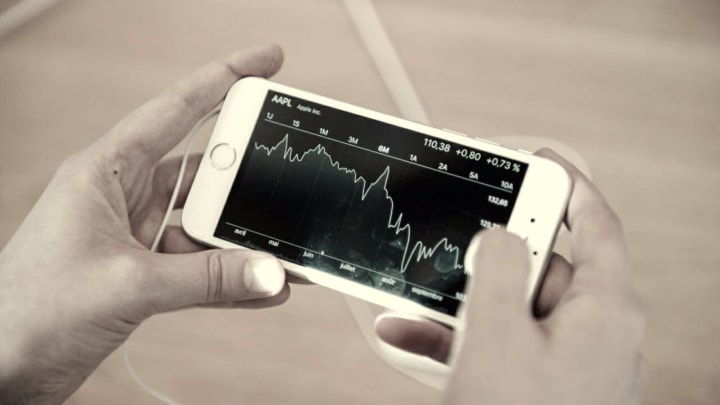10 Reasons Why You Shouldn't Panic Sell
Don't be a Chicken Little in the stock market. You shouldn't panic sell, even if it's a bear market.

Back when I was very young, I was told the story of Chicken Little. Do you remember that tale? If you don't, let me refresh you on this classic childhood story and the moral it has.
Chicken Little was the tiny bird who had an acorn dropped on his head, panicked, and believed that the sky was falling. After freaking out, he had everyone following his lead—only to be proven a fool in the end. It's an old fable that's told to us to remind us not to panic.
This was one of the most memorable stories I heard during my childhood. One would think we'd remember Chicken Little when trading stocks, right? Sadly, this is not the case.
Much like Chicken Little, investors are prone to panic selling. This term refers to the act of selling off large quantities of shares when the stock market dips out of fear of greater losses.
It's a knee-jerk reaction that seems smart, but in most cases, you shouldn't panic sell under any circumstances. Here's why.
Stocks fluctuate heavily all the time, and it may just be a blip.

When you're dealing with money, it's really hard to ignore the need to sell the moment that a stock slumps. This is especially true in a bear market, when people start wondering whether or not companies will survive.
You shouldn't panic sell during times of volatility for one reason, and one reason only: Most stocks will bounce back eventually—even if it seems like they are permanently wrecked.
That's why top investors tend to suggest riding out the volatility. By just riding it out, you're actually avoiding one of the most terrible mistakes people make with their money when investing. Trust yourself to prevent a permanent loss that may later turn into a profit.
Moreover, panic selling guarantees a loss.
Think about what panic selling really is for a moment. It's an act that makes you decide to take a financial loss immediately, rather than take a gamble and reap better profits. In most cases, the gambit pays off the moment the market recovers.
When you sell your investments out of fear of a greater loss, you are only guaranteeing a loss on your end. When your stock is sold, you can't make gains when it recovers. Should it recover, all that your panic will have done is remove money from your wallet that could have stayed there.
Stock market investing is not an emotional activity.
The worst thing that you can do is make your decisions based on emotions when investing in the stock market. Stock investing is a very rational activity; emotions take the logic out of the decisions you make.
Following the crowd blindly as the numbers tumble is never a wise decision. Most investors really don't put much due diligence into their investments, and panic when things turn downwards.
When stocks recover and their true value is shown, the same people who just sold their shares end up looking sheepish. They, usually, know they were wrong in hindsight.
This is the kind of output that knee-jerk, instinctual reactions have. It's the financial equivalent of a hothead who explodes into rage during a date, only to find himself left alone at a restaurant.
To really figure out whether or not you should sell, you need time to evaluate the stock in question.

The thing about selling out of fear is that it's an act that's done without much information backing your decision. A major reason you shouldn't panic sell is because it robs you of time you could be spending figuring out if you should even panic.
In many cases, looking at a company's true value, profits, and track record will prove that there's no need to freak out. If the company's value remained stable in other like circumstances, chances are that it will remain a great investment in the long term.
Volatility doesn't actually hurt the stock market.
When the S&P 500 recently dropped a couple hundred points, a huge portion of the country sold off their shares. It's a common problem with just about every market decline, but that doesn't mean it's a wise choice.
Within a matter of weeks, the market gained back its losses. Volatility doesn't actually hurt the market as much as you think it does. In fact, it's a natural cycle of the stock market—as well as stock trades.
If you invested in quality stocks, they will weather the storm.
Times of market volatility are when your portfolio is really put to the test, and you shouldn't panic sell if you are confident in the stocks you chose. Quality companies will be able to endure tough times, even when others might fold around them.
This principle is the entire cornerstone of any beginner's guide to value investing. I'm just going to point out, this is the chosen investment strategy for financial gurus like Warren Buffett. If you researched your companies well, you won't have much to worry about.
Panic selling is a very "short term" investment strategy.

Remember that analogy I gave about the guy who went on a date, got angry at something, had an outburst, and then had his date ditch him? There's a reason why I chose that analogy; it's very similar when you take a look at a situation where the similarities are uncanny.
Let's call the guy in question Dave. Dave doesn't really care to control his emotions. He's an "in the moment" kind of guy. Let's say the incident in question was something along the lines of a somewhat rude comment made by the date, Sally.
Sally's remark may have been rude, but in reality, it was not a comment directed at him. Dave felt threatened by the comment, and feeling an urge to react, shouts at her until people turn their heads.
Sally, terrified by his seemingly sudden outburst, gets up and leaves without a word. She tells her friends he's a violent creep. He apologizes, but Sally won't return his calls.
Had Dave taken pause and asked Sally to clarify her thoughts, he might have still had a chance with her. However, his drastic overreaction killed that notion off completely.
Panic selling is similar because it's an overreaction to something that really won't affect you in the long term. By selling off your shares, you are overreacting and ruining your chances of turning a profit.
You should be more worried about a market that doesn't have a pullback.
One of the reason you shouldn't panic sell is because of what it says about the economy. An economic downturn is actually a healthy thing for portfolios. It's a correction of price bloating, which means it's actually one of the ways investors deal with market volatility. When this correction happens and prices are low, it's a good time to buy.
Those who panic sell during a market correction don't just lose stocks worth keeping; they also miss out on amazing prices on stocks they won't afford later.
Corporations are becoming more profitable than ever.
In 1970s, a company that has a billion-dollar profit in a year was unheard of. Nowadays, we have major companies like Amazon, Apple, GE, and Unilever that post those kinds of profits every year.
Considering how much more profitable companies are, panic selling really doesn't make that much sense.
Finally, the biggest reason why you shouldn't panic sell is because of the way investing works.

Investments go up and down. They will occasionally be a loss regardless of how long you stay put. Even though loss is almost guaranteed at times, riding out the turmoil is still the best move in most cases.
So, don't panic. Just hold onto your seat and do your due diligence. You'll be alright.
About the Creator
Iggy Paulsen
Iggy Paulsen is a fan of anything and everything wholesome. He loves his two dogs, hiking in the woods, traveling to Aruba, building DIY projects that better humanity, and listening to motivational speakers. He hopes to eventually become a motivational speaker himself.






Comments
There are no comments for this story
Be the first to respond and start the conversation.